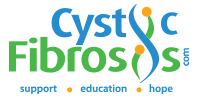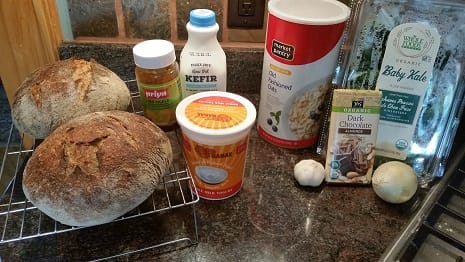Probiotics and Prebiotics in Food – benefits in the cystic fibrosis diet
yogurt
kefir milk
buttermilk
soy/nut milks
fermented soft cheeses (also gouda, cheddar, swiss, parmesan)
kombucha tea
sauerkraut (unpasteurized)
kimchi
miso soup
tempeh
sourdough bread
olives
sour pickles (not pickles made in vinegar)
leeks
asparagus
chicory
Jerusalem artichokes
kale (and other dark leafy greens)
garlic
onions
whole grains (barley, rye, oats, flaxseed, wheat and more)
legumes (e.g. red kidney beans and lentils)
soybeans
chocolate
bananas
honey
maple syrup
These lists are a sample of probiotic and prebiotic foods, and in doing your own research, you may find other foods that could be on the lists.
Having healthy intestinal bacteria is important for everyone, but especially for people with cystic fibrosis. People with CF may be on constant or alternating antibiotic therapy and they often have an array of GI problems: bicarbonate deficiency, abnormal bile salts, mucosal transport problems, motility differences, and anatomical structural changes.
How do probiotics and prebiotics play an role in healthy intestinal flora?
PROBIOTICS
These days when a person is prescribed antibiotics, they are told to take probiotic pills or eat yogurt to replenish the intestinal bacteria that the antibiotics kill off. We know that antibiotics can cause diarrhea, and in worse scenarios, the antibiotic kill-off of helpful bacteria can allow life threatening bacteria like clostridium difficil (c-diff) to proliferate without competition, resulting in severe diarrhea, weight loss and even death.
Probiotic pills are given to people to try to boost the populations of healthy bacteria in the intestines. Clinical trials have shown that particular strains of probiotics help prevent Antibiotic Associated Diahrrea (AAD) and might help prevent Clostridium Difficile Associated Diahrrea (CDAD).
Probiotic pills vary in quantity of live bacteria, type of bacteria, and protective coating. Moreover, the amount of live bacteria that survive the acidic stomach environment varies from person to person, and from day to day.
In addition to pills, you may be able to improve your gut flora by eating foods that naturally have probiotics. These are foods that involve fermentation.
PREBIOTICS
Prebiotics are foods that contain a type of plant fiber that nourishes the good bacteria in the large intestine and colon. Unlike probiotics, prebiotics are not at risk for destruction in the stomach. From this article, “Fiber and Prebiotics: Mechanisms and Health Benefits,” in the journal “Nutrients”:
Although all prebiotics are fiber, not all fiber is prebiotic. Classification of a food ingredient as a prebiotic requires scientific demonstration that the ingredient [2]:
- Resists gastric acidity, hydrolysis by mammalian enzymes, and absorption in the upper gastrointestinal tract;
- Is fermented by the intestinal microflora;
- Selectively stimulates the growth and/or activity of intestinal bacteria potentially associated with health and well-being.
The ability of prebiotics to improve outcomes in diseases like Irritable Bowel Syndrome and Constipation is still not determined, according to this article in the “American Journal of Gastroenterology.” However, the positive influence of prebiotics on gut flora is confirmed in the “Nutrients” article:
In a study with 40 female subjects, wheat dextrin supplementation (8 g per day) for fourteen days not only increased bacteroides, the predominant beneficial saccharolytic genus of a normal gut flora but also decreased the numbers of pathogenic bacteria. Psyllium was found to have prebiotic potential in a small (n = 11) study in women [45].
The article also notes that it is important to consider dose and individual tolerance:
Fibers that are fermented quickly may lead to excessive gas production and bloating, so dose is an important consideration.
That said, adults in the U.S. typically only consume 15 grams of fiber a day, which is about half the recommended total dietary fiber intake of 25 to 30 grams a day from food.




